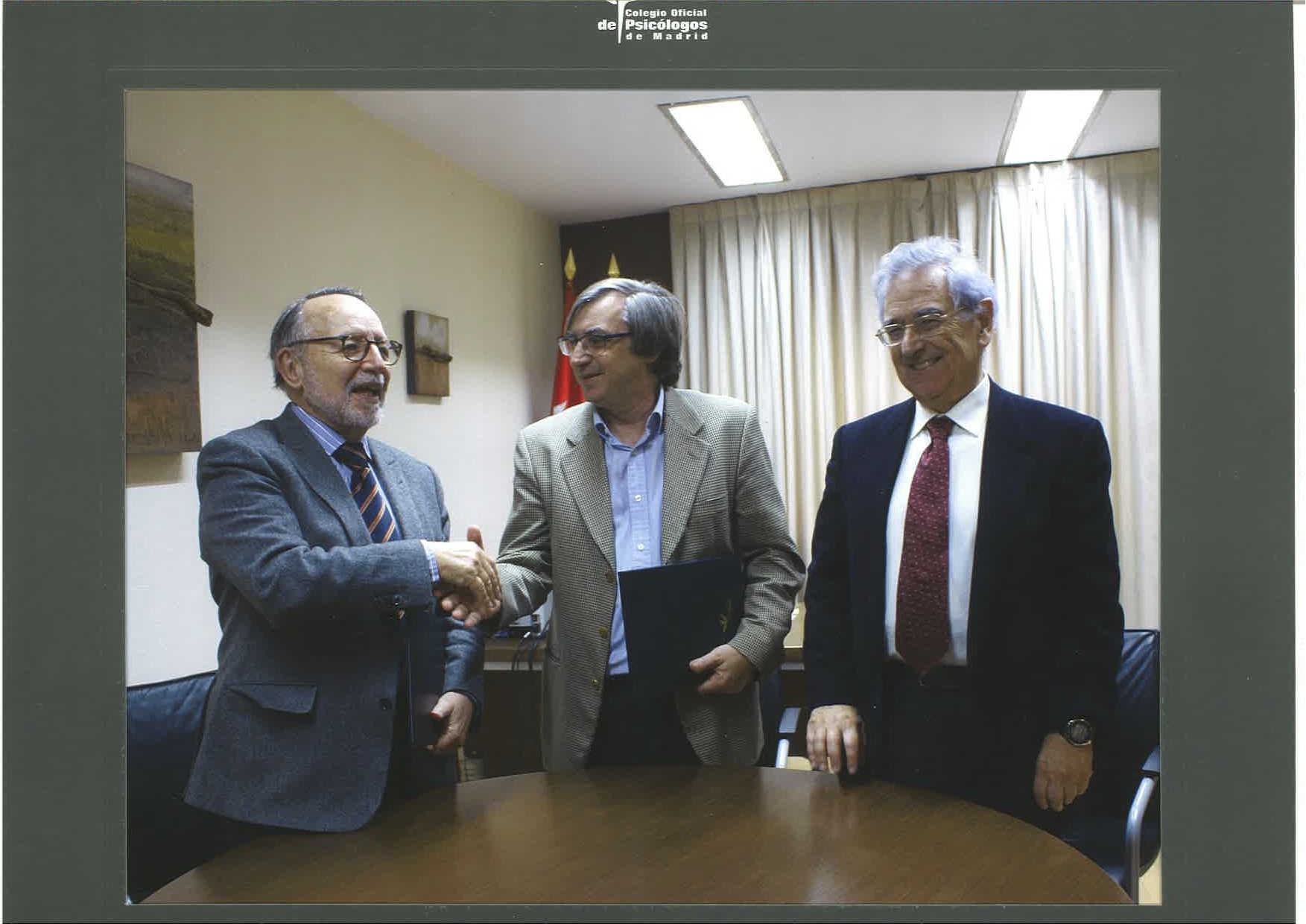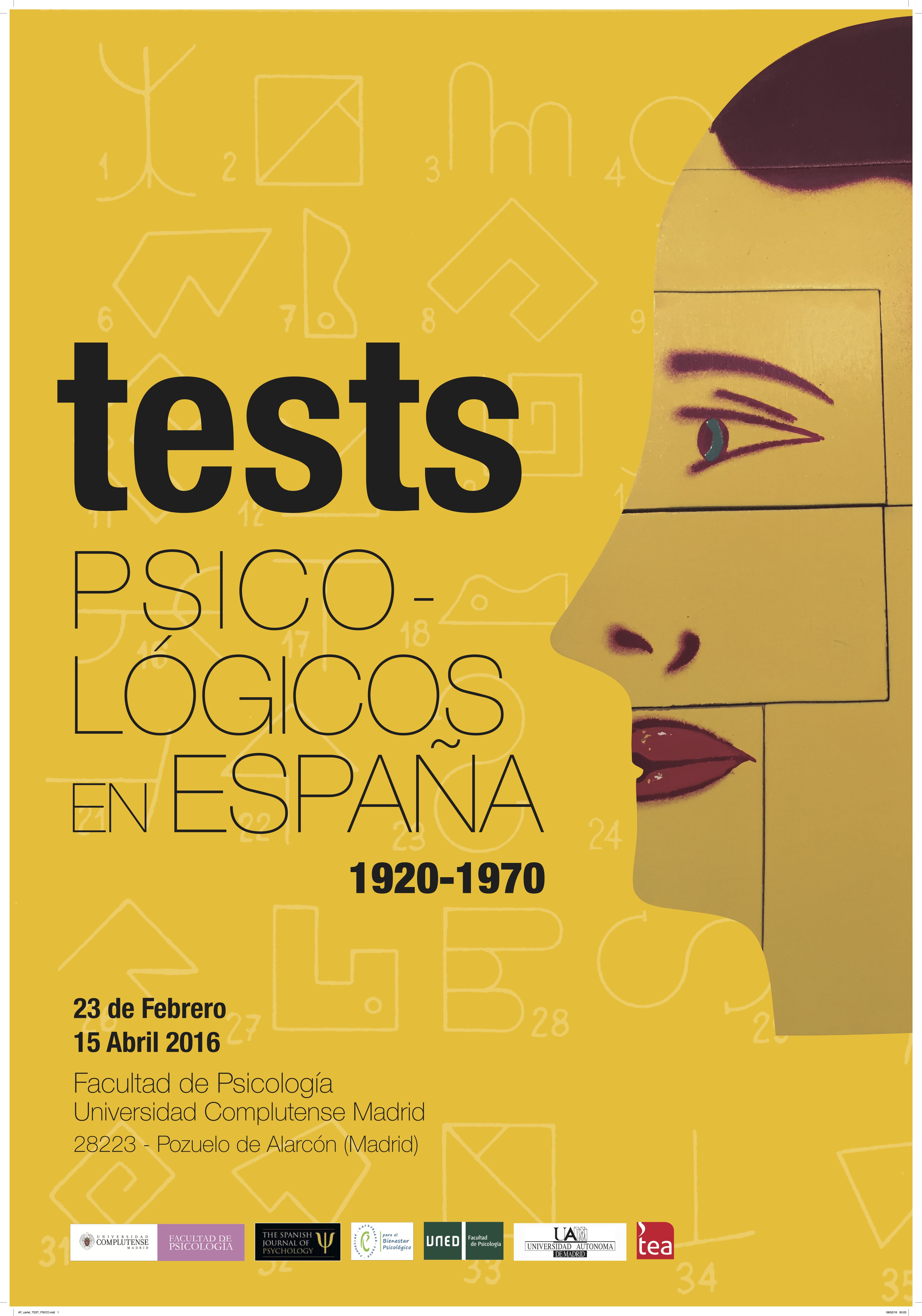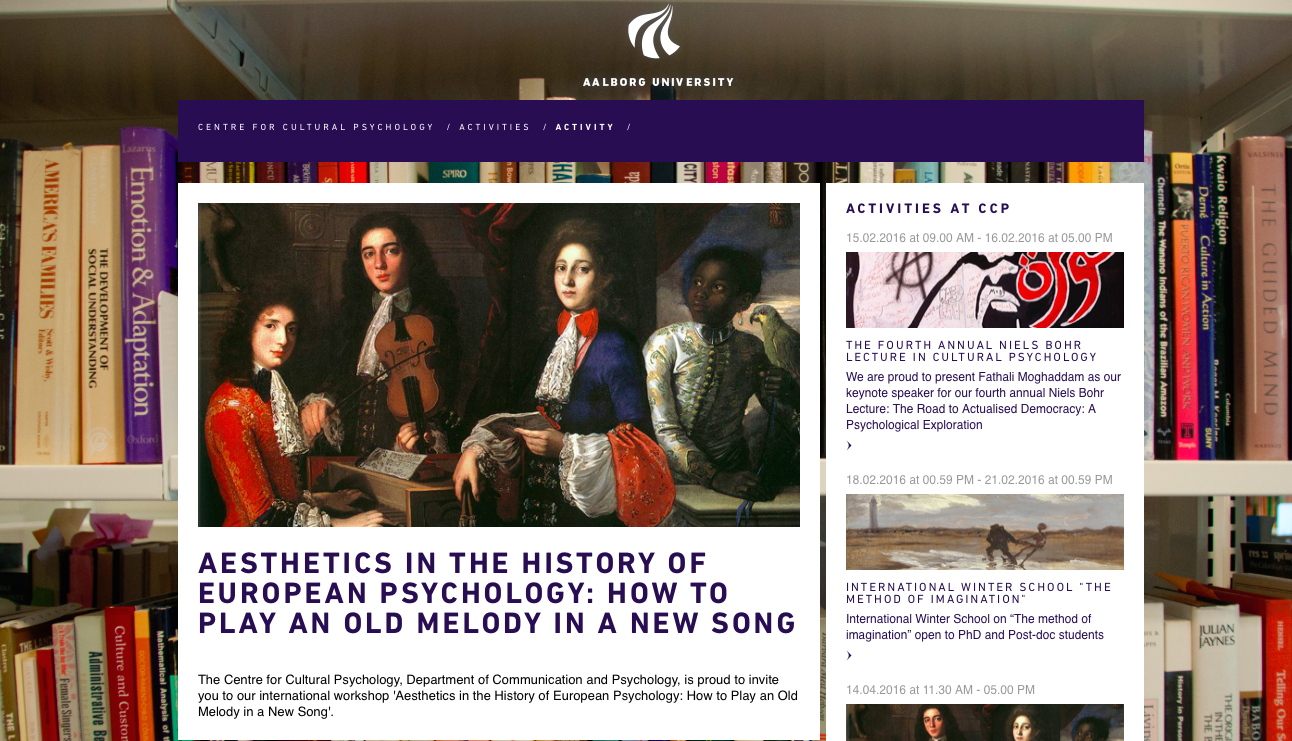Archivo de la categoría: Blog
Convenio edición RHP – COP
El Director de la revista Historia de la Psicología, D. Helio Carpintero, y el Decano del Colegio Oficial de Psicólogos de Madrid, D. Fernando Chacón, firmaron el pasado 28 de enero un convenio a través del cual el Colegio será co-editor de esta revista, que edita nuestra Sociedad. Así lo acaba de recoger la Guía del psicólogo publicada por el COP, que se puede consultar aquí.
La revista, fundada en el año 1980 y pionera de esta especialidad en España, Europa y Latino-América, recibió en 2014 el Certificado de Revista Excelente otorgado por Fundación Española para la Ciencia y la Tecnología(FECYT). Se publica desde hace unos años en formato digital y en abierto, y así lo seguirá haciendo tras la firma de este convenio, con el que se pretende fomentar su difusión y visibilidad.
El COP de Madrid, que tiene entre sus objetivos la edición de revistas científico-profesionales en el ámbito de la psicología, a través de este convenio se compromete a proporcionarnos: una plataforma digital de gestión editorial (registro y seguimiento de manuscritos) y asesoramiento para su uso; una URL amigable de acceso a la web de la revista a través de la web del COP; colaboración en la composición del Comité Editorial (proponiendo al menos dos miembros); y difusión y promoción de la revista a través de diferentes soportes (newsletter, web, Guía del Psicólogo…). La Revista, por su parte, se compromete a asumir los costes de maquetación y diseño, que serán facturados por el COP a la SEHP.
Post-doctoral fellowship on «Hidden Persuaders» Project
The History, Classics and Archaeology Department at Birkbeck, University of London is pleased to announce a fully funded three-year post-doctoral fellowship to work on a project that falls within the scope of Daniel Pick’s Wellcome Trust senior investigator award, ‘Hidden Persuaders? Brainwashing, Culture, Clinical Knowledge and the Cold War Human Sciences, c. 1950-1990’.
The new post-doctoral fellow will work closely with the Hidden Persuaders team to produce original research, organise academic conferences and public events, and also assist with various other outputs in the form of edited volumes, film, web resources and more. The post-doc will join our growing network of historians and practitioners of psychoanalysis, psychiatry and psychology, and should focus his/her research contributions on one or more distinct strands of the Hidden Persuaders project, described here.
We would welcome applications from academics with prior knowledge of the history of psychoanalysis, psychiatry and/or psychology. Some previous familiarity with post-war political and/or cultural history would also be an asset. A working knowledge of one or more European languages other than English, e.g., Russian, German, Spanish or French would be useful, as would facility in one or more Asian languages (Chinese, Korean, Vietnamese, Khmer or Malay). The ability and willingness of the appointee to travel and work for several weeks at a stretch in overseas archives (as required) is essential, as part of the post-doctoral fellow’s task will be to gather and analyse data on perceptions and use of psychological warfare and indoctrination in various Cold War campaigns overseas.
The closing date for completed applications is midnight on Wednesday 13 April 2016.
Interviews will be held on Thursday 28 April 2016.
For further information, please consult the job announcement on Birkbeck’s website.
Exposición Tests Psicológicos (1920-1970)
Del 23 de febrero al 15 de abril, en la Facultad de Psicología de la Universidad Complutense de Madrid, se puede visitar esta exposición sobre los Tests Psicológicos en España, comisariada por Ana Calles e Isabel Calonge.
La inauguración tendrá lugar el martes 23, día del patrón de Psicología, San Huarte de San Juan, a las 12h en el Salón de Actos José Germain. El programa incluye una conferencia a cargo de Helio Carpintero, Presidente Academia de Psicología de España.
Para más información, pulse aquí.
The Future of the History of the Human Sciences
University of York
Thursday 7th & Friday 8th April 2016
This two-day meeting, hosted jointly by Dr Chris Renwick and History of the Human Sciences, gathers together established scholars and early-career researchers to consider changes wrought in the broad interdisciplinary field of the history of the human sciences by new developments in the medical humanities, biological sciences, and literary/cultural theory. Marking the end of James Good’s 15-year tenure as HHS editor and the beginning of a new editorial team, comprising Dr Felicity Callard, Dr Rhodri Hayward, and Dr Angus Nicholls, the meeting will survey the field’s development since the foundation of HHS almost 20 years ago, and offer provocations – from various disciplinary perspectives – about the directions that it might take in the future.
Speakers include Roger Smith, Steve Fuller, Peter Mandler, Marianne Sommer, Amanda Rees, Michael Finn, Elizabeth Toon, Jessica Hendy, Maurizio Meloni, Des Fitzgerald, Alexandra Bacopoulos Viau, and Jonna Brenninkmeijer.
There will be four intensive sessions:
- The Problem of the Archive: biological data, digital media, material culture, and their impact upon the archive and human nature;
- The Problem of the Human: how the neurosciences are challenging conventional approaches to history;
- The Problem of the Social: How do models of ‘the social’ in the life sciences challenge those in the social sciences and humanities?
- Practice in the Human Sciences: new methods and approaches in medical humanities and science studies.
These sessions will be followed by a roundtable in which the outgoing and incoming History of the Human Sciences editors, plus speakers from the conference, discuss the state of the field and its future.
In keeping with the field’s history and the future challenges that will be discussed, the conference organisers wish to encourage scholars from a wide range disciplinary backgrounds to participate. Attendance is free but places are limited.
As part of the conference organisers’ commitment to encouraging discussion about the future of the field, six bursaries covering the costs of attending the conference are available for postgraduate students. More information about how to apply for one of these bursaries is available on the postgraduate bursaries page of the conference website.
Further information about the event is available on the conference website.
Call for Abstracts: Cultures of Self-Help: Disordered Selves, Emergent Sociality, and Collective Horizons of Auto-Transformation
2016 AES (American Ethnological Society ) SPRING MEETING
Washington, D.C., March 31-April 2, 2016
discourse and a mode of labor through which people around the world make
sense of their selfhood and their social relations. Invoking the academic
expertise of psychology, self-improvement has become a global phenomenon
not only through consumerism and the spread of the therapeutic ethos; it
has also come to organize broad swaths of communal, associational, and
intimate life amidst flexible capitalism and the retrenchment of the state.Critiques of self-help argue that it embeds neoliberal notions of self-care
and self-management at the expense of social responsibilities and
interdependencies. They argue that self-help at once replaces social
solidarities within austerity politics and a fraying social fabric, while
also reproducing race, class, and gender hierarchies by qualifying selfhood
according to access and availability to spend time in projects of
self-fashioning (Illouz 2008, McGee 2007). Whereas ‘self-help’ often posits
the commercialization of human relationships through metaphors of costs,
gains, and self-improvement, it may also constitute new imaginations of
social collectivity and ethics in times of uncertainty and transition.
This panel seeks ethnographic approaches to understanding the possibilities
and perils of self-help in diverse social contexts. How do social
applications of self-help reconfigure power, create social networks, and
apportion new rationalities and affective states of embodied control,
dependency and precariousness? How do actors seek to resolve disorder and
incoherence in personal and social spheres by using techniques of
self-help? How does self-help inculcate normative social relations, or
alternately posit emergent possibilities for emancipatory social action?
Possible paper topics may address, but are not limited to:
– · Ethnographic analyses of community-based self-help
associations;
– · Imbrications of religious activism and self-help, including
religious, spiritual, or ‘new age’ applications of self-help practices;
– · Regimes of self-help as modalities of political and economic
governance, including development apparatuses and microfinance;
– · Self-help in the context of rehabilitation, including medical
and therapeutic interventions and addiction treatment programs;
– · Self-help and self-control, including self-tracking and ‘life
hacking’ practices within the application of data and measurement to
lifestyle, health, and notions of the ‘quantified self’;
– · Sensory or phenomenological accounts of disability,
able-bodiedness, and subjectivity in self-help;
– · Self-help, ‘soft skills’, and affective labor within global
service industries and corporate management structures;
– · Digital ethnography of online or virtual self-help
communities, including anonymous chat-rooms, message boards, and other
interactive digital worlds.
Please send paper abstracts of up to 250 words to
awallace@gradcenter.cuny.edu by or before Friday, February 12th, 2016.
Nuevo número de invierno del BSEHP
No sin cierto retraso, acabamos de publicar el nuevo número de invierno del BSEHP, cargado de artículos, reseñas y novedades, además de un homenaje especial a Milagros Sáiz (1957-2015), ex-presidenta de la Junta Directiva de la SEHP y una de las socias más entrañables, fallecida el día 1 de agosto.
Os dejamos aquí el índice, esperando que sea de vuestro interés.
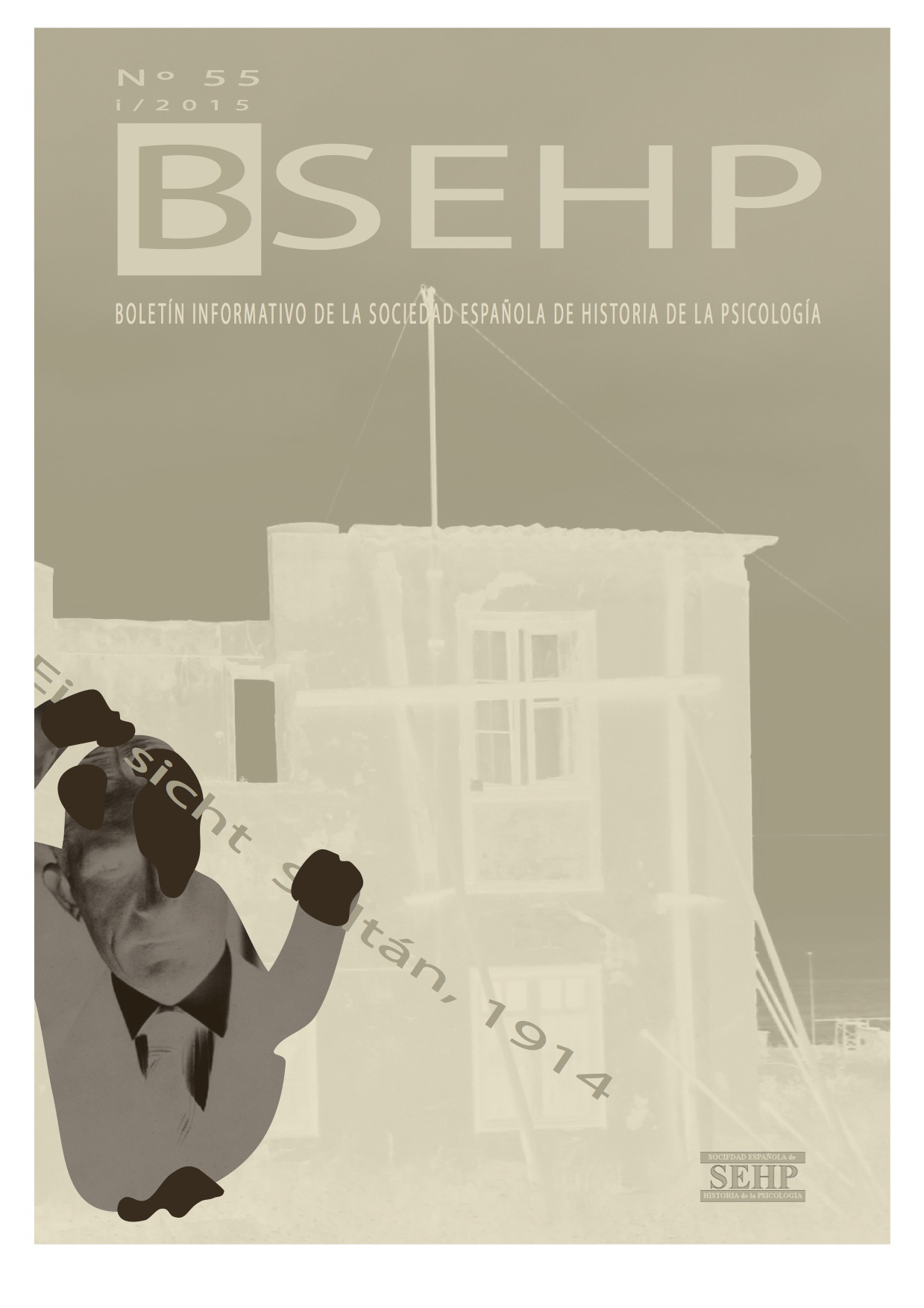
EDITORIAL
ARTÍCULOS
Juan Carlos Gómez. Wolfgang Köhler y la Estación de Antropoides de Tenerife: 100 años de psicología moderna.
José María Gondra. El último artículo de John B. Watson.
John B. Watson. (1932). Por qué no me suicido. Texto traducido por José María Gondra
RESEÑAS CRÍTICAS
Libros
Iván Sánchez-Moreno. Matamoro, Blas. (2015). Nietzsche y la música. Madrid: Fórcola Ediciones / Wagner, Richard (2013). Cartas sobre Luis II de Baviera y Bayreuth. Edición de Blas Matamoro. Madrid: Fórcola Ediciones.
Mònica Balltondre. Valiente Barroso, Carlos (Coord.) (2014). 13 académicos ante el diálogo ciencia y religión. Religión y ciencia interdisciplinar. Madrid: Síntesis.
Encuentros
Walter L. Arias Gallegos. III Seminario de Historia de la Psicología Peruana y Latinoamericana. Arequipa (Perú), 9 de septiembre de 2015.
EL DESVÁN DE PSI
Iván Sánchez-Moreno. ¿Coprolito o mierdaseca?: Usos del talentómetro soriano.
HOMENAJE A MILAGROS SÁIZ
Helio Carpintero. Milagros Sáiz (1957-2015), en su marcha apresurada.
MIlagros Sáiz.(1989). Ramón Turró: una aproximación historiográfica-bibliométrica. Tesis doctoral (extracto). Bellaterra.
Publicaciones destacadas de Milagros Sáiz.
AESTHETICS IN THE HISTORY OF EUROPEAN PSYCHOLOGY: HOW TO PLAY AN OLD MELODY IN A NEW SONG
The Centre for Cultural Psychology, Department of Communication and Psychology, is proud to invite you to our international workshop ‘Aesthetics in the History of European Psychology: How to Play an Old Melody in a New Song’.
The programme includes 3 target presentations, commentaries by early-stage researchers and a plenary discussion. Colleagues and students are also invited to actively participate in the discussion.
11.30: Professor Gordana Jovanovic, Belgrade University, Serbia;
12.00: Professor Hroar Klempe, NTNU, Norway;
12.30: Professor Falk Heinrich, AAU, Denmark.
13.00: Lunch Break
14.00: Early-stage Researcher Commentaries
15.30: Plenary Discussion, Chair: Professor Jaan Valsiner
This workshop is part of the «migrating» programme of initiatives, mainly addressed to doctoral students and early-stage researchers, established by a network of Danish research groups developing a new look at the theoretical psychology, cultural psychology, epistemology and history and psychology of everyday life for a productive (rather than re-productive) approach to the study of human beings.
HOW TO PARTICIPATE
Ph.d students and early-stage researchers are very welcome to participate with commentaries. You are kindly invited to register at luca@hum.aau.dk before April 1st, so you will receive the target papers.
Each participant is required to prepare a commentary draft (from 500 to 1000 words) that will be discussed during the workshop. Drafts must be sent no later than April 7.
An international publication will be edited including the target papers and the commentaries.
HOST
Luca Tateo
2nd Call for Papers XXIX Symposium SEHP
«Historia de la Psicopatología y de la Psicoterapia: Teorías y Prácticas Iberoamericanas»
U. Portucalense (Porto, Portugal)
4-6 mayo 2016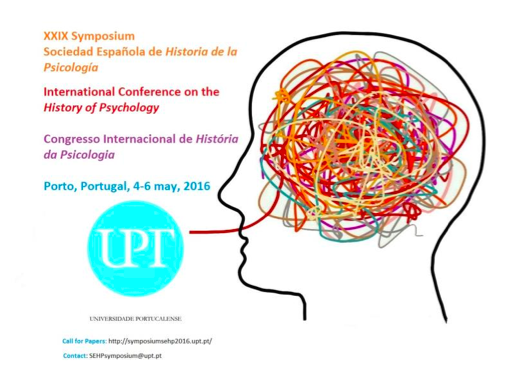
2ª Invitación a Comunicaciones / Call for Papers
Como sabéis, este año la Sociedad Española de Historia de la Psicología organiza su XXIX Symposium anual en la Universidad Portucalense, desde 4 hasta 6 mayo 2016.
Os recordamos que la fecha de envío de propuestas se ha ampliado hasta el 29 de febrero de 2016.
Para más información, podéis consultar aquí, en la página del congreso, todos los datos prácticos y realizar la inscripción online.
Tenure Track Assistant Professor Theory/History of Psychology
Organisation
Since its foundation in 1614, the University of Groningen has enjoyed an international reputation as a dynamic and innovative center of higher education offering high-quality teaching and research. Balanced study and career paths in a wide variety of disciplines encourage the 30,000 students and researchers to develop their own individual talents. Belonging to the best research universities in Europe and joining forces with prestigious partner universities and networks, the University of Groningen is an international place of knowledge.
The Faculty of Behavioural and Social Sciences is a center of knowledge focusing on individuals and society. The faculty studies issues relating to human behaviour, and the relationships between people and society as a whole. This includes the study of how people function under normal circumstances, but also of the problems encountered by individuals or groups, and how these can be resolved or prevented. The Department of Psychology is part of the Faculty of Behavioural and Social Sciences, and offers bachelor’s and master’s programmes in both Dutch and English to over 3000 students.
Job description
The Department of Psychology at the University of Groningen invites applicants for a tenure track position in the philosophy, sociology and history of science as applied to psychology, broadly defined. Candidates are eligible with an excellent command of 20th century philosophy and sociology of science as well as the history of psychology.
Qualifications
We are looking for candidates who meet the following requirements:
- PhD degree in a relevant field of Psychology or a related discipline
- a relevant publication record demonstrating your ability to publish international academic publications, affinity with STS-oriented research
- substantial experience and a clear interest in teaching
- a clear interest in collaborative and interdisciplinary research
- the ability to attract funding for research projects
- the ability to communicate verbally and in written form in English and Dutch (or willingness to learn Dutch).
For any further information, click here.
